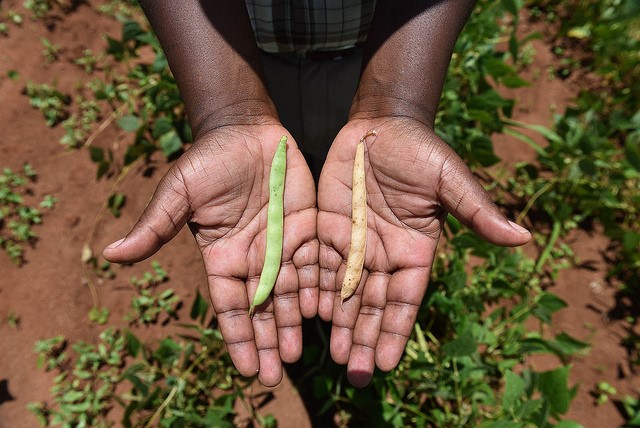By Enid Katungi
For the past two decades, the Pan-Africa Bean Research alliance (PABRA), has stepped-up efforts in Zimbabwe to help farmers boost their bean production as a pathway to reducing poverty.
This is done with the support of the Swiss Agency for Cooperation and Development (SDC). With the same support, we conducted a nation-wide baseline survey, interviewing 750 bean growing households in 2016.
Our findings show that incidences of drought, pests and disease are on the rise, causing significant yield loss – especially for farmers who rely on rain-fed agriculture.
Farmers who have access to irrigation are better able to mitigate the effects of drought, by applying more inputs to obtain higher yields. But for those relying on rain-fed agriculture, access to more resilient bean varieties is more urgent than ever.
In addition, improved bean seeds need to be used in tandem with fertilizers at optimal rates. High seed prices pose another limiting factor for smallholder farmers, and strategies to reduce the price of seed may include linking community based seed production with formal seed companies, strengthening rural based-seed marketing outlets.
Our results show that any innovation including seeds – to be attractive to farmers – should increase bean yields by at least 30 percent under rain-fed, and 10 percent under irrigated conditions.
Gender implications:
The study also highlights some socioeconomic aspects critical for maximizing impacts. First, use of irrigation in bean production increases demand for labor. Women are more likely to bear the burden of unpaid labor, while men benefit from increased demand for hired labor.
Although women mostly influence decisions around bean production, men still control various aspects of sale. Women also decide what is put on the family table for food – but the research shows that while families may cultivate beans, 33 percent of households eat beans only once a week, compared to 4.6 times a week by food secure households.
These outcomes of the report urge that complementary interventions – in addition to improved bean varieties – are necessary.
Lessons learned…
Farmers are generally satisfied with the bean market traits but a significant number of them would prefer to access new varieties that are improved in their production traits to cope with increase in production constraints.
From this study, we have learnt that private seed companies play an important role in variety diffusion in Zimbabwe, but their marketed varieties cannot be easily identified by farmers. Thus knowledge management systems should consider integrating actors including farmers to facilitate the closing of this knowledge gap. As the new technologies are disseminated to farmers, there is also need to monitor how gender influences uptake as well as changes in gender roles and control over beans.
Photo credit: Neil Palmer / CIAT

